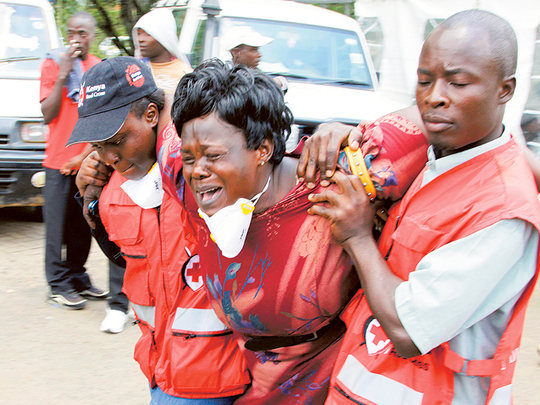
Nairobi: Kenyans prepared to march for greater national security on Tuesday following last week’s massacre by Somalia’s Al Shabab militants, ahead of a candlelit vigil on the final day of mourning for the 148 people killed by the militants.
Tuesday’s demonstration, expected in the afternoon in central Nairobi, comes as security forces continue their hunt for those behind the university killings.
A vigil is planned for early evening on the third and final day of national mourning.
Kenyan fighter jets pounded camps belonging to the Al Qaida-linked extremists in southern Somalia on Monday, but anger has been growing over allegations that critical intelligence warnings were missed.
Special forces units took seven hours to reach the university in Garissa last Thursday, some 365 kilometres (225 miles) from the capital, as Al Shabab gunmen stormed dormitory buildings.
The extremists lined up non-Muslim students for execution in what President Uhuru Kenyatta described as a “barbaric medieval slaughter”.
The massacre, Kenya’s deadliest attack since the 1998 bombing of the US embassy in Nairobi, claimed the lives of 142 students, three police officers and three soldiers.
“We shall not forget,” the Standard newspaper front-page read, as media printed the faces of those killed in the attack, even as scores of relatives continue an agonising wait for the remains of their loved ones at the main mortuary in Nairobi.
Vigil organiser Boniface Mwangi, who has urged Kenyans to come with flowers and to dress in black for the vigil in Nairobi’s Uhuru Park — or “Freedom” in Swahili — has been deeply critical of the country’s security failings.
“Entrenched corruption in the security system allows Al Shabab to move freely in and out of Kenya and carry out such attacks with ease,” said Mwangi, a civil society activist.
The army said Monday’s air strikes destroyed two extremist bases, and followed a promise by Kenyatta that he would retaliate “in the severest way possible” against the Al Shabab militants for their attack last Thursday.
Kenyan aeroplanes have made repeated strikes in southern Somalia since sending troops into their war-torn neighbour in 2011 to attack Al Shabab bases, with Nairobi later joining the African Union force fighting the Islamists.
The Al Shabab fled their power base in Somalia’s capital Mogadishu in 2011, and continue to battle the AU force, AMISOM, sent to drive them out. It includes troops from Burundi, Djibouti, Ethiopia, Kenya and Uganda.
The Shebab group has carried out a string of revenge attacks in neighbouring countries, notably Kenya and Uganda, in response to their participation in the AU force.
On Saturday, Al Shabab warned of “another bloodbath” unless Kenya withdraws its troops from Somalia, and threatened a “long, gruesome war”.
Al Shabab fighters also carried out the Westgate shopping mall attack in Nairobi in September 2013, a four-day siege which left at least 67 people dead.
Five men have been arrested in connection with the university attack, including three alleged “coordinators” captured as they fled towards Somalia, and two others seized in the university compound.
A $215,000 (Dh789,000) bounty has also been offered for alleged Al Shabab commander Mohammad Mohamud, a former Kenyan teacher said to be the mastermind behind the attack and believed to now be in Somalia.
Authorities have named one of the four gunmen killed as a fellow Kenyan, highlighting Al Shabab’s ability to recruit within the country.
Interior ministry spokesman Mwenda Njoka said high-flying Abdirahim Abdullahi, an ethnic Somali, was a university law graduate described by those who knew him as an A-grade student and “a brilliant upcoming lawyer”.
Forensic investigators aided by foreign experts have scoured the site, where an AFP reporter on Monday was among the first journalists to enter since the attack, describing bullet-scarred buildings, blood stains on the floors, and an abattoir-like stench across the campus.
Although Kenyatta has vowed to retaliate for the massacre, there have also been calls for national unity.
In an address to the nation on Saturday, Kenyatta said people’s “justified anger” should not lead to “the victimisation of anyone” — a clear reference to Kenya’s large Muslim and Somali minorities in a country where 80 per cent of the population is Christian.












